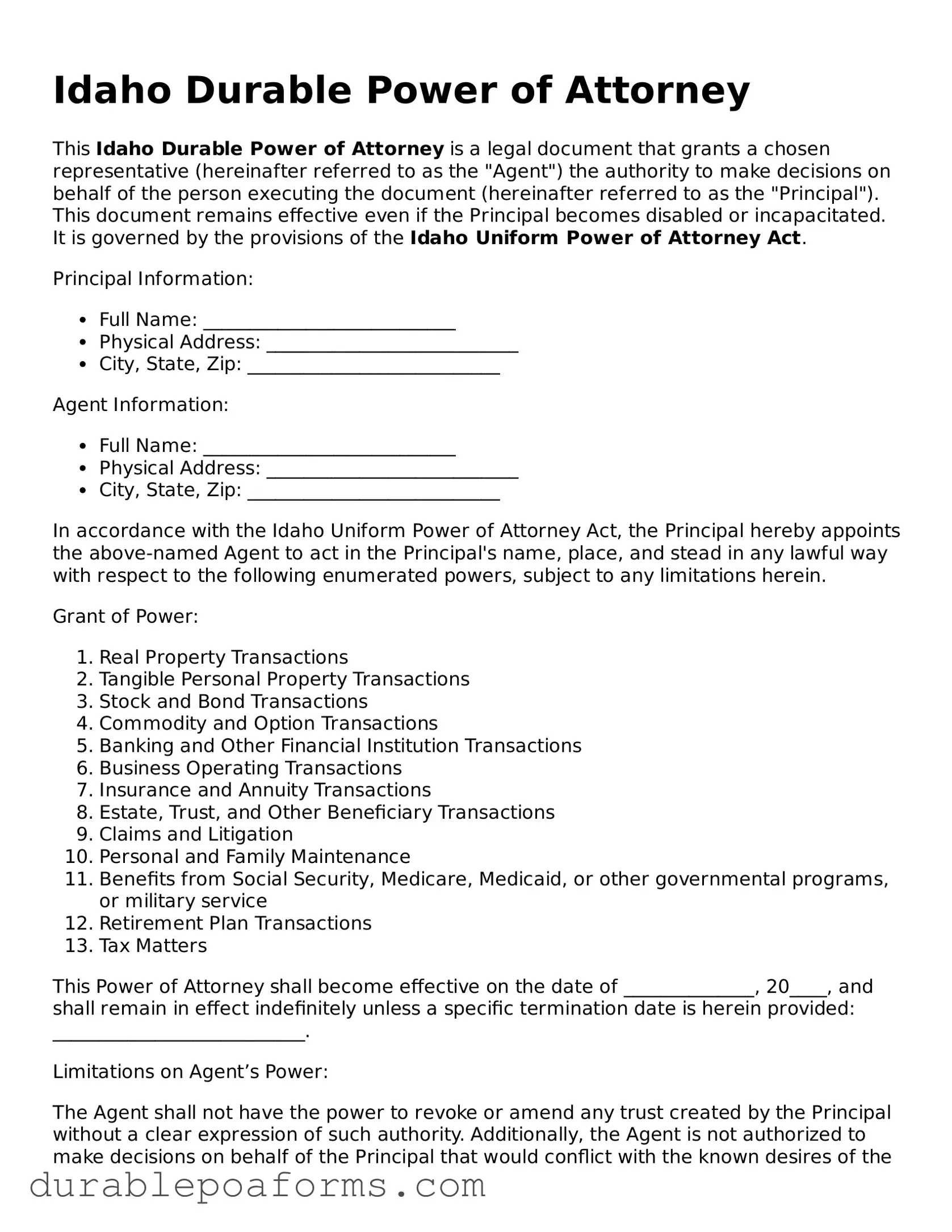Idaho Durable Power of Attorney
This Idaho Durable Power of Attorney is a legal document that grants a chosen representative (hereinafter referred to as the "Agent") the authority to make decisions on behalf of the person executing the document (hereinafter referred to as the "Principal"). This document remains effective even if the Principal becomes disabled or incapacitated. It is governed by the provisions of the Idaho Uniform Power of Attorney Act.
Principal Information:
- Full Name: ___________________________
- Physical Address: ___________________________
- City, State, Zip: ___________________________
Agent Information:
- Full Name: ___________________________
- Physical Address: ___________________________
- City, State, Zip: ___________________________
In accordance with the Idaho Uniform Power of Attorney Act, the Principal hereby appoints the above-named Agent to act in the Principal's name, place, and stead in any lawful way with respect to the following enumerated powers, subject to any limitations herein.
Grant of Power:
- Real Property Transactions
- Tangible Personal Property Transactions
- Stock and Bond Transactions
- Commodity and Option Transactions
- Banking and Other Financial Institution Transactions
- Business Operating Transactions
- Insurance and Annuity Transactions
- Estate, Trust, and Other Beneficiary Transactions
- Claims and Litigation
- Personal and Family Maintenance
- Benefits from Social Security, Medicare, Medicaid, or other governmental programs, or military service
- Retirement Plan Transactions
- Tax Matters
This Power of Attorney shall become effective on the date of ______________, 20____, and shall remain in effect indefinitely unless a specific termination date is herein provided: ___________________________.
Limitations on Agent’s Power:
The Agent shall not have the power to revoke or amend any trust created by the Principal without a clear expression of such authority. Additionally, the Agent is not authorized to make decisions on behalf of the Principal that would conflict with the known desires of the Principal expressed while the Principal was capable of making their own decisions, unless a court of law directs otherwise.
Governing Law: This document shall be governed by and construed in accordance with the laws of the State of Idaho.
Acknowledgment by Principal:
I, _________________________ [Principal's Name], acknowledge that I have read and understand this Power of Attorney and the powers I am granting to my Agent under it. I sign this document voluntarily and with the intention of authorizing my Agent to manage my affairs as described, should I become disabled or incapacitated.
Principal's Signature: _________________________ Date: ______________
State of Idaho
County of _________________________
Subscribed and sworn before me this ____ day of ______________, 20____, by _________________________ [Name of Principal].
Notary Public Signature: _________________________
My Commission Expires: ______________
Acknowledgment by Agent:
I, _________________________ [Agent's Name], acknowledge that I have read and understand the powers that are being granted to me by the Principal in this Idaho Durable Power of Attorney. I agree to act in the Principal’s best interest and in accordance with all applicable laws and regulations. I understand that this authority is granted to me as of the date the Principal signs this document, and it shall continue to remain in effect as outlined herein.
Agent's Signature: _________________________ Date: ______________
